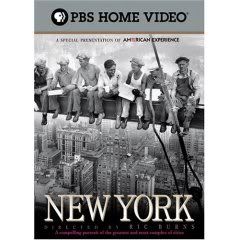The Next Industrial Evolution
 Löb Strauss, a German born New Yorker who took on the more English name of Levi and started a clothing company that would go on to become a hallmark of the American image, said this of building a customer base before consumerism had taken a hold in the psyche of the American population, “The problem is not to know how to produce the goods, but to know how to produce the customers.” A historian in the 8-part PBS documentary called New York quoted this as he spoke of the beginnings of culture as we know it today. This fascinating documentary put together by Ric Burns covers New York City from when it was nothing but an island inhabited by three to four hundred Manahata Indians to the fall of the Twin Towers in 2001.
Löb Strauss, a German born New Yorker who took on the more English name of Levi and started a clothing company that would go on to become a hallmark of the American image, said this of building a customer base before consumerism had taken a hold in the psyche of the American population, “The problem is not to know how to produce the goods, but to know how to produce the customers.” A historian in the 8-part PBS documentary called New York quoted this as he spoke of the beginnings of culture as we know it today. This fascinating documentary put together by Ric Burns covers New York City from when it was nothing but an island inhabited by three to four hundred Manahata Indians to the fall of the Twin Towers in 2001. In this particular part of the series World War 1 had just ended and the industrial revolution was rapidly gaining strength. Consumer goods were beginning to be marketed on a mass scale with the advent of the assembly line. The relatively unexplored realm of advertising was being delved into with new advances in radio broadcasting technology. The Age of the Appliance was coming to fruition. Electric irons, washing machines, refrigerators, freezers and a plethora of other household items that today seem indispensable simply didn’t exist in homes until as recently as the 1950’s and 60’s.
Hearing all of this prompted me to start thinking about how in less than 50 years an entire planet had been radically changed. The effects of technology, good and bad, had impacted every corner of the globe in some way. I was talking to my friend Mike about how society has changed more in the last one hundred years than in all the centuries that have preceded it. We live in one of the most exciting, scary and overwhelming times humanity has ever seen.
Along that same vein, it has appalled me to see the way our insatiable appetite for technology and all that powers it have devastated the earth in ways that we didn’t think was possible. Entire mountain ranges leveled, forests that stood for thousands of years wiped out in less than a decade, entire societies brought into a crazed and degrading form of slave labor simply to save a few pennies and turn a bigger profit for someone down the line (and I mean way down the line).
It wasn’t until after a few days of wrestling with how we came to be the society we are today that I found some hope (because as a human I am prone to try and find light in the blackest of nights) in this a simple yet profound thought; the same power that started this culture of consumption could also be the thing that is used to reign it in and change what we use and how we use it. The same advertising agencies could “propagate” a different message to the masses, one that teaches us how to use what we already have to accomplish what we thought could only be done by this product or that.
I have begun the research process of looking into already existing ways of bettering the relationship between consumables, consumers and everything in between. Please, feel free to dialogue with me as I work through this process. All comments, suggestions and thoughts are more than welcome (Actually, I believe they are needed, especially to have a well rounded perspective of these issues).

0 Comments:
Post a Comment
<< Home